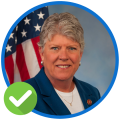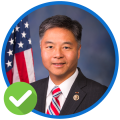Elect Chris Holden for Supervisor to put Los Angeles County on the right track for progress.
Assm. Chris Holden’s track record and policy positions demonstrate that he will be a progressive voice for the constituents of Los Angeles County and will govern effectively in the best interests of this diverse district.
Progressive endorsements: Assm. Holden has the endorsement of some progressive groups, including California Working Families Party, LA County Democratic Party, and SEIU2015. He has also received the endorsement of many state and local leaders, including Attorney General Rob Bonta, Sec. of State Dr. Shirley Weber, Assm. Speaker Robert Rivas, Assm. Isaac Bryan, and several city councilmembers.
Electoral history: Assm. Holden has served in the State Assembly since 2012, when he was elected with 58% of the vote. In 2022, he won his reelection against a Republican challenger by 20 points.
Top issues: Workforce development programs, worker protections, transportation, criminal justice reform, improving public services, and environmental protections.
Governance and community leadership experience: Assm. Holden is a public official, and has used his positions to improve access to economic and educational opportunities for his constituents. As a member of the State Assembly, he has successfully passed legislation to improve worker conditions, fund local libraries and hiking trails, and invest in improved services for individuals with disabilities. He has also been a strong proponent of establishing dual enrollment options for high school students to reduce the time and financial burden of college and to increase access to local career pathways.
Assm. Holden scores a Lifetime CS of 95 out of 100 on Courage Score, our annual analysis of legislators’ progressive voting records, and has been designated as a Courage All-Star for his commitment to progressive values. Based on our Courage Score analysis, Assm. Holden has supported the most progressive bills that made it to a vote, although he has failed to cast a vote on bills related to charter school regulation, expanding single-use recyclables, and predatory lending protections.
Prior to his election to the State Assembly, Assm. Holden was a local elected official, serving for 24 years on the Pasadena City Council, including a turn as mayor. During this time, he also served as a member of the Burbank-Glendale-Pasadena Airport Authority. Assm. Holden also owns a local real estate firm, CHMB Consulting. He is a longtime supporter of transportation expansion and college and career access for high school students. As a city councilmember and assemblymember, he has worked on initiatives to expand light rail and public transportation options for local constituents.
Other background: Assm. Holden is a lifelong resident of Pasadena.
The Race
Primary election: There are five candidates running in the nonpartisan March 5 primary, including Assm. Chris Holden, incumbent Supervisor Kathryn Barger, Konstantine Anthony, Perry Goldberg, and Marlon Marroquin. The top two vote recipients will advance to the general election on November 5 unless one candidate receives more than 50% of the vote and wins outright in the primary.
Candidate fundraising and pledges: Assm. Holden’s campaign has raised $663,000 as of December 2023, and is funded by corporate PAC, real estate, fossil fuel, and police interests.
Opposing candidate: Supervisor Kathryn Barger
Opposing candidate’s fundraising and pledges: Supervisor Barger’s campaign has raised $595,000 as of December 2023, and is funded by police, real estate, and corporate PAC interests.
Opposing candidate: Konstantine Anthony
Opposing candidate’s fundraising and pledges: Anthony’s campaign has raised $35,000 as of December 2023, and is funded entirely by individual donors.
The District
County: Los Angeles County is California's most populous county. District 5 includes Arcadia, Burbank, Claremont, Glendale, Glendora, La Verne, Lancaster, portions of Los Angeles, portions of Los Feliz, Monrovia, portions of North Hollywood, Palmdale, Pasadena, Santa Clarita, Sierra Madre, South Pasadena, Porter Ranch, Shadow Hills, Universal Studios, Valley Village, and unincorporated communities.
Governance structure: Los Angeles County’s Board of Supervisors oversees the needs of 9.7 million people and manages an estimated budget of $39 billion annually. According to the County Charter, Los Angeles County is governed by the Board of Supervisors, which has executive, legislative, and quasi-judicial authority. Voters also elect an assessor, a district attorney, and a sheriff, who work alongside the Board of Supervisors to govern within the county.
The Position
Each of the 58 counties in California is governed by a five-person Board of Supervisors. A Board of Supervisors has legislative and executive power to manage county services and resources, including courts, jails, public health, and public lands. They also have quasi-judicial powers, which gives them the right to hold hearings, conduct investigations, and make decisions in a manner similar to judicial courts. Laws passed by Boards of Supervisors are generally called ordinances. Because counties include both incorporated cities which are administered by their own city councils and unincorporated areas which are directly administered by the county, ordinances may or may not apply in different areas of the county. Supervisors are typically limited to 3 terms, or 12 years in office total.
Elect Chris Holden for Supervisor to put Los Angeles County on the right track for progress.
Assm. Chris Holden’s track record and policy positions demonstrate that he will be a progressive voice for the constituents of Los Angeles County and will govern effectively in the best interests of this diverse district.
Progressive endorsements: Assm. Holden has the endorsement of some progressive groups, including California Working Families Party, LA County Democratic Party, and SEIU2015. He has also received the endorsement of many state and local leaders, including Attorney General Rob Bonta, Sec. of State Dr. Shirley Weber, Assm. Speaker Robert Rivas, Assm. Isaac Bryan, and several city councilmembers.
Electoral history: Assm. Holden has served in the State Assembly since 2012, when he was elected with 58% of the vote. In 2022, he won his reelection against a Republican challenger by 20 points.
Top issues: Workforce development programs, worker protections, transportation, criminal justice reform, improving public services, and environmental protections.
Governance and community leadership experience: Assm. Holden is a public official, and has used his positions to improve access to economic and educational opportunities for his constituents. As a member of the State Assembly, he has successfully passed legislation to improve worker conditions, fund local libraries and hiking trails, and invest in improved services for individuals with disabilities. He has also been a strong proponent of establishing dual enrollment options for high school students to reduce the time and financial burden of college and to increase access to local career pathways.
Assm. Holden scores a Lifetime CS of 95 out of 100 on Courage Score, our annual analysis of legislators’ progressive voting records, and has been designated as a Courage All-Star for his commitment to progressive values. Based on our Courage Score analysis, Assm. Holden has supported the most progressive bills that made it to a vote, although he has failed to cast a vote on bills related to charter school regulation, expanding single-use recyclables, and predatory lending protections.
Prior to his election to the State Assembly, Assm. Holden was a local elected official, serving for 24 years on the Pasadena City Council, including a turn as mayor. During this time, he also served as a member of the Burbank-Glendale-Pasadena Airport Authority. Assm. Holden also owns a local real estate firm, CHMB Consulting. He is a longtime supporter of transportation expansion and college and career access for high school students. As a city councilmember and assemblymember, he has worked on initiatives to expand light rail and public transportation options for local constituents.
Other background: Assm. Holden is a lifelong resident of Pasadena.
The Race
Primary election: There are five candidates running in the nonpartisan March 5 primary, including Assm. Chris Holden, incumbent Supervisor Kathryn Barger, Konstantine Anthony, Perry Goldberg, and Marlon Marroquin. The top two vote recipients will advance to the general election on November 5 unless one candidate receives more than 50% of the vote and wins outright in the primary.
Candidate fundraising and pledges: Assm. Holden’s campaign has raised $663,000 as of December 2023, and is funded by corporate PAC, real estate, fossil fuel, and police interests.
Opposing candidate: Supervisor Kathryn Barger
Opposing candidate’s fundraising and pledges: Supervisor Barger’s campaign has raised $595,000 as of December 2023, and is funded by police, real estate, and corporate PAC interests.
Opposing candidate: Konstantine Anthony
Opposing candidate’s fundraising and pledges: Anthony’s campaign has raised $35,000 as of December 2023, and is funded entirely by individual donors.
The District
County: Los Angeles County is California's most populous county. District 5 includes Arcadia, Burbank, Claremont, Glendale, Glendora, La Verne, Lancaster, portions of Los Angeles, portions of Los Feliz, Monrovia, portions of North Hollywood, Palmdale, Pasadena, Santa Clarita, Sierra Madre, South Pasadena, Porter Ranch, Shadow Hills, Universal Studios, Valley Village, and unincorporated communities.
Governance structure: Los Angeles County’s Board of Supervisors oversees the needs of 9.7 million people and manages an estimated budget of $39 billion annually. According to the County Charter, Los Angeles County is governed by the Board of Supervisors, which has executive, legislative, and quasi-judicial authority. Voters also elect an assessor, a district attorney, and a sheriff, who work alongside the Board of Supervisors to govern within the county.
The Position
Each of the 58 counties in California is governed by a five-person Board of Supervisors. A Board of Supervisors has legislative and executive power to manage county services and resources, including courts, jails, public health, and public lands. They also have quasi-judicial powers, which gives them the right to hold hearings, conduct investigations, and make decisions in a manner similar to judicial courts. Laws passed by Boards of Supervisors are generally called ordinances. Because counties include both incorporated cities which are administered by their own city councils and unincorporated areas which are directly administered by the county, ordinances may or may not apply in different areas of the county. Supervisors are typically limited to 3 terms, or 12 years in office total.






















































